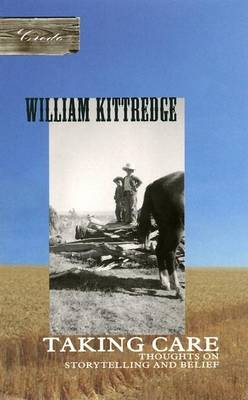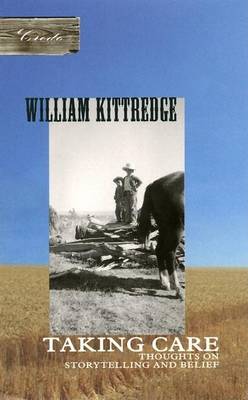
- Retrait gratuit dans votre magasin Club
- 7.000.000 titres dans notre catalogue
- Payer en toute sécurité
- Toujours un magasin près de chez vous
- Retrait gratuit dans votre magasin Club
- 7.000.0000 titres dans notre catalogue
- Payer en toute sécurité
- Toujours un magasin près de chez vous
Description
In Taking Care, William Kittredge relates his coming of age on a property his family transformed from a farm dependent on horses to a modern agribusiness. Painfully reflecting on the abandonment of old ways, Kittredge calls for new, radical stories about the West that will foster compassion and caret "Earnest, attentive, and ruminative." --KIRKUS "Our character is formed," William Kittredge writes, "by the stories we learn to live in." In Taking Care, Kittredge tells the story of his family's homestead in the Great Basin, a ranch worked by horses when he was a boy and transformed into an agribusiness by the time he was a grown man. Recounting his life as farmer and writer, he acknowledges the desire for efficiency that led him to spoil the land he loves. He writes about the tough issues of owning property and owning up to who and what we are. And he advocates for a new set of radical stories about the West, stories to foster compassion and caretaking. The future, he argues here, begins with narratives that allow us to give back to the "systems of order that have supported us...before what we adore simply vanishes." "Earnest, attentive, and ruminative...For William Kittredge, our stories--from cultural hallmarks to everyday utterances--bespeak our system of values, and our conduct toward the land is the measure of our decency. . . . Kittredge's hope is to add his voice to a coherent myth our society can inhabit." --Kirkus "Stories direct our actions, William Kittredge argues, serving as a connector to disparate parts of our lives. They are essential for the survival of our society." --Library Journal
Spécifications
Parties prenantes
- Auteur(s) :
- Editeur:
Contenu
- Nombre de pages :
- 162
- Langue:
- Anglais
- Collection :
Caractéristiques
- EAN:
- 9781571312327
- Date de parution :
- 20-10-99
- Format:
- Livre broché
- Format numérique:
- Trade paperback (VS)
- Dimensions :
- 127 mm x 203 mm
- Poids :
- 181 g

Les avis
Nous publions uniquement les avis qui respectent les conditions requises. Consultez nos conditions pour les avis.






